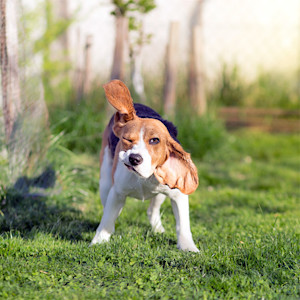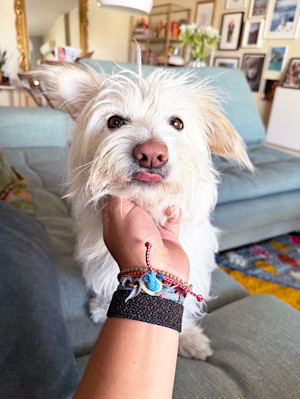Why Is My Dog Obsessed With Snapping the Air?
If your dog is snapping at the air, it could be more than just play

Share Article
In this article:
What is fly-biting?opens in a new tab Causesopens in a new tab Diagnosisopens in a new tab Treatmentopens in a new tab Is fly-biting serious?opens in a new tab Frequently asked questionsopens in a new tab
Watching a dog trying to catch a fly can be pretty comical, but if your dog snaps the air when there’s nothing there, it may cause you concern.
Fly-biting, or fly-snapping, is a condition in which a dog appears to be snapping or biting at flies that are not there. It is one of the most common compulsive behaviours that a dog displays, and it is usually quite sporadic or infrequent.

littleKin™ is Kinship’s home just for puppy and kitten parents. Bop over to check out expert advice, new pet tools, and special deals—all curated for your newest family member.
opens in a new tabThe behaviour is usually very sudden and is pretty tricky to diagnose, as you can’t predict when it will happen or bring an episode on at will to show your vet. Researchers say genetics, neurological disorders, eye problems or digestive disorders may cause fly-biting. Read on to learn more about fly-biting behaviour, including what to do if your dog starts exhibiting it.
What does fly-biting look like?
Before an episode of fly-biting begins, dogs raise their heads, extend their necks, appear to focus on something in the air and snap at it. Episodes may occur sporadically or at regular intervals and consist of various snaps. These episodes may be accompanied by behavioural changes such as a sudden show of agitation or other behaviours such as jumping and licking. Licking is the most common co-occurrence in researchopens in a new tab on the syndrome and includes the licking of the front limbs, hips, air and floor.
What causes fly-biting in dogs?
There’s not one clear cut reason behind fly-biting in dogs. In fact, research into fly-biting is ongoing and evolving. When Dr Emily Cross was in veterinary school, she learned that fly-biting behaviours are usually symptoms of a partial seizure. Dr Cross explains, “I was told if the dog’s eyesight is normal, a partial seizure is the culprit. However, new science is casting doubt on this assumption.”
Fly-biting behaviour may not be as straightforward as vets and researchers once thought. Genetics, neurological disorders, eye problems or digestive disorders may cause fly-biting behaviours.
Genetics
Dr James Ede, clinical director and practice owner of Millie’s Vetopens in a new tab, says fly-biting is thought to be more of an issue in dogs with a high working drive, including various Spaniel breeds and Collies.
Researchopens in a new tab has found that Cavalier King Charles Spaniels may be predisposed to syringomyelia, a condition in which fluid-filled cavities develop within the spinal cord. Fly-biting may be a symptom. While this disorder is not unique to Cavaliers, it is more common among the breed, due to risk of genetic Chiari-like malformation where there is a mismatch between skull and brain size. There are screening criteria available to breeders to help reduce this issue within the breed and vets encourage potential dog parents to only buy from reputable breeders.
Eye issues
Dr Cross says that if your dog is fly-biting, they may have vision issues, or something may be impairing their view. “I had one dog whose parent brought her in for fly-biting, and it turns out it was just a case of overgrown eyebrows and the dog trying to bite at the obstruction,” she explains.
As dogs age, much like humans, their vision can deteriorate along with issues such as cataracts, which can cause them to misjudge distances when biting at something, this can look similar to fly-biting behaviour. An eye exam by your vet can help differentiate between these issues vs other causes.
Focal seizures
According to Dr Cross, unlike a generalised seizure, in which the brain’s electrical signals become hyperactive and begin firing abnormally, causing visible effects on the body, a focal seizure only affects a localised region of the brain and has limited effects on the body. These effects may vary significantly, depending on which portion of the brain is affected.
Dr Cross says, “A focal seizure might be repeated eyelid, lip or ear twitching. It may cause a dog to snap or bite at the air. There is not necessarily a loss of consciousness. These types of seizures usually don’t require treatment. However, a focal seizure can segue into a generalised seizure, so keep a close watch on your dog until it passes.” Pet parents should try to keep note of these occurrences and the length of episodes to tell your vet as there are treatment options to reduce severity and frequency of focal seizures if needed, along with further investigative options.
Gastrointestinal issues
A small 2012 studyopens in a new tab by researchers at the University of Montreal Veterinary Teaching Hospital concluded that fly-biting may be a sign of gastrointestinal (GI) issues. The researchers evaluated seven dogs to characterise fly-biting, performed a complete medical evaluation of dogs presented with fly-biting, and evaluated the outcome of this behaviour following appropriate treatment of the underlying medical condition.
Yes, the sample size was tiny, but all seven dogs were diagnosed with some GI disease, including delayed gastric emptying, inflammation of various parts of the GI tract, gastro-oesophageal reflux, and/or a flaccid and distended stomach. The fly-biting was entirely resolved in five cases when the dogs received treatment for their GI disease.
There is currently a lot of talk in the human medical field about how the gut can have a wider effect on the body and this is no different within the veterinary community. Further research may provide clearer treatment options and management strategies in the next few years. Along with the fly-biting behaviour, if you notice your dog salivating more than usual, retching or vomiting (particularly bile) then talk to your vet about dietary management options and gastrointestinal investigations and treatments.
Behavioural issues
Behaviourist and owner of Barket Place Caroline Wilkinsonopens in a new tab says that if medical issues have been ruled out, the fly-biting might be an obsessive-compulsive behaviour. “Sometimes this behaviour can come from boredom, frustration or a developmental phase with the dog,” says Caroline.
However, just because an issue is diagnosed as behavioural does not mean there aren’t ways to manage and even treat the issue through medical and training interventions. Your vet will be able to give you advice on next steps to do at home along with being able to refer your pet to a veterinary behaviourist or certified animal behaviourist, and, if needed, can prescribe medication to help your pet.
How is fly-biting diagnosed?
Dr Ede advises that for people concerned about this (or any other) abnormal or altered behaviour in their dog, a visit to the vet for a thorough check-up would always be a sensible place to start. “With fly-biting specifically, it may be prudent to have a routine health screening blood test performed as this can help to identify, or equally importantly rule out, many medical issues. If clinical examination by the vet and those initial blood tests fail to show an issue, then advanced imaging may be recommended to look for structural or physical issues within the brain and/or spinal cord. A specialist in veterinary neurology would undertake this.”
Some of these investigations can be covered with insurance so look into your details of cover or talk to your insurance provider to check, and as with all investigations your vet will work together with you to decide which diagnostic options are best for you and your pet’s individual situation.
Treatment of fly-biting behaviour
The treatment of fly-biting behaviour will depend on the underlying cause of the behaviour. With genetic underlying issues such as syringomyelia and Chiari-like malformationopens in a new tab, the treatment options include both medical and surgical management options, depending on the type and clinical signs.
Not all patients require treatment – as some are only mildly affected or asymptomatic – but for those that do require medication, pain relief is used alongside medication that reduces the build up of spinal fluid and those that dampen down hyperexcitable nerves. Pets that have severe clinical signs also have surgical options which help relieve the pressure physically, this is a specialist surgery performed by a neurology specialist.
For focal seizures, your dog may be prescribed the same anti-epileptic medications used for generalised seizures, which can be used in managing fly-biting. These medications vary in benefits and possible side effects, so your veterinarian will consider your dog’s history and severity of clinical signs to determine the best drug to prescribe. Follow ups will then be done routinely to make sure the clinical signs are being managed while aiming for the lowest effective dose to reduce the risk of potential side effects.
Once diagnosed, Dr Cross says gastrointestinal issues in dogs often need strict adherence to a diet that works best for the individual dog and supplements or medications to manage symptoms. These may include:
Anti-nausea medications.
Antacids and stomach/intestinal protectants.
Medicines to relieve diarrhoea.
Pre and probiotics formulated for pets.
If the fly-biting is behavioural or due to an obsessive compulsive issue, several things can be done to treat it, including:
Identifying and eliminating potential triggers.
Observing your dog’s environment to identify any possible triggers causing the behaviour, such as stress, anxiety, or excitement.
If you can identify the trigger, you can try eliminating or managing it better.
Caroline recommends providing plenty of mental and physical stimulation, as this can help engage your dog’s mind and body, reducing fly-biting behaviour. There are useful pheromone based plug-ins and diffusers produced for dogs that can help reduce stressopens in a new tab, along with supplements recommended by your vets.
Make sure to run any supplements you want to use for your pet by your vet as some have ingredients which can cause adverse effects when mixed with certain medications. The majority of treatments for behaviour-related issues are home routine and management-based along with focussed training and potentially working with a veterinary behaviourist or clinical animal behaviourist. There are also medications that can be prescribed to your pet to help in certain situations.
How serious is fly-biting behaviour?
Dr Cross says that while fly-biting may be concerning, it does not warrant an emergency vet appointment. She recommends noting any other symptoms your dog may have, as your vet will ask about these at your appointment. “If you can catch the fly-biting behaviours on camera, this can help your vet, along with other symptoms that may help guide diagnosis, such as signs of digestive distress, behavioural issues or twitching that may indicate neurological issues,” she says. “We will take a full history and examine your dog before committing to invasive – and potentially expensive – tests.”
According to Dr Cross, seizures related to neurological conditions in dogs are rare, with epilepsy affecting just 0.75 percent of the canine populationopens in a new tab. “Before we assume that the behaviour is neurological, we will rule out other, less serious conditions,” she adds, “and even if the fly-biting behaviour is down to seizures, treatments are available to help your pup, so try not to be overly concerned – which I know is easier said than done!”
Frequently asked questions
What causes fly-biting in dogs?
Fly-biting dogs often exhibit compulsive behaviours related to underlying medical conditions, such as gastrointestinal or neurological disorders. Fly-biting may also be a sign of obsessive-compulsive behaviour.
Should I take my dog to the vet for fly-biting?
If you notice your dog exhibiting fly-biting behaviour, it's a good idea to take them to the veterinarian. Fly-biting can indicate an underlying medical or behavioural issue that requires evaluation and treatment.
What do you feed a dog with fly-biting behaviour?
If fly-biting behaviour is caused by a digestive disorder such as inflammatory bowel disease (IBD), your vet may recommend a specialist diet or medication to help ease their symptoms.
Is there a cure for fly-biting behaviour?
Fly-biting is a symptom rather than a condition, so once the underlying condition is treated, the fly-biting behaviour should improve.
Resources
Frank, Diane et al. “ Prospective medical evaluation of 7 dogs presented with fly biting.opens in a new tab” The Canadian veterinary journal = La revue veterinaire canadienne, vol. 53,12 (2012): 1279-84.
Bécuwe-Bonnet, Véronique, et al. “ Gastrointestinal disorders in dogs with excessive licking of surfaces.opens in a new tab” Journal of Veterinary Behavior, vol. 7, no. 4, July 2012, pp. 194–204.
Rusbridge, C. “ Neurological diseases of the Cavalier King Charles Spaniel.opens in a new tab” Journal of Small Animal Practice, vol. 46, no. 6, June 2005, pp. 265–272.
Heske, L., et al. “ A Cohort Study of Epilepsy among 665,000 Insured Dogs: Incidence, Mortality and Survival After Diagnosis.opens in a new tab” The Veterinary Journal, vol. 202, no. 3, Dec. 2014, pp. 471–76.
Hunter, T., & Barnett, C. (n.d.). Focal seizures and fly-biting in dogs: VCA Animal Hospitals.opens in a new tab VCA.
Tod, Elaine, et al. “ Efficacy of Dog Appeasing Pheromone in Reducing Stress and Fear Related Behaviour in Shelter Dogs.opens in a new tab” Applied Animal Behaviour Science, vol. 93, no. 3-4, Elsevier BV, Mar. 2005, pp. 295–308.
Carter, BVSc (Hons), MMED Vet (Med), Alian J. “ Syringomyelia in Cavalier King Charles Spaniels and the Incidence in South Africa.opens in a new tab” The World Small Animal Veterinary Association – Congress 2014, Vin.com, 2014. Accessed 27 Mar. 2025.

Catherine Renton
Catherine Renton is a writer based in Edinburgh whose work has been featured in Vogue, Elle, Glamour, Refinery29, and the Guardian, among others. When she's not writing, she is tending to the every whim of her cocker spaniel Bonnie, who loves belly rubs, people and chasing squirrels.
Related articles
![Beagle dog shaking body and ears]() opens in a new tab
opens in a new tabWhy is My Dog Obsessed With ‘Shaking It Off’, Even When They’re Dry?
It’s more than just a quirky habit
![]() opens in a new tab
opens in a new tabDoes Your Dog Understand When You’re On the Phone?
And do they want to join in?
![dog greeting a woman at the door]() opens in a new tab
opens in a new tabWhy Is My Dog Obsessed With Sniffing Me Every Time I Come Home?
From your mood to where you’ve been, your dog’s sniffing tells them a lot about you
![pic of a white dog sitcking his tongue out with a human hand under his chin]() opens in a new tab
opens in a new tabWhen Does ‘Blepping’ Become a Cause For Concern?
Obviously it’s adorable, but can it mean something more sinister?



